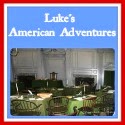The Great Plague of London during William Penn's young adulthood was the last epidemic of the bubonic plague that occurred in the Kingdom of England. Bubonic plague first appeared in England in the 1300s, re-emerging intermittently until the mid-1600s. Nearly 100,000 people died from this disease in 1665. In August 1665 alone, over 31,000 people died from the disease and ultimately, 15 percent of the population of London by the time the flare subsided. The disease was caused by rat fleas that carried the Yersinia pestis bacterium. The nursery rhyme “Ring Around the Rosy” makes references to this great plague:
- “Ring around the rosy” refers to the red swelling that occurs around the neck.
- “A pocket full of posies” refers to a bouquet of flowers kept with some that were believed to ward off evil spirits that caused the disease.
- “Ashes, ashes” refers to that more people were dying than graves could be dug, so the bodies were starting to be cremated.
- “We all fall down” refers to the deaths of the entire families that were diagnosed with the disease.
Although the Great Fire of London caused massive destruction to the city, it actually helped end the epidemic because it also destroyed the rats and fleas that carried the disease.
This disease was also called the Black Death because the disease turned large areas of the victim’s skin turned black. Other symptoms include loss of intelligence and stumbling movements, fever, vomiting and pain so severe that the person couldn’t sleep (adding to the delirium). Those diagnosed with this disease were boarded up in their homes with their entire famies. A red cross and the words “May the Lord have mercy” marked their doorways. They were then left for forty days and nights. Those who survived the quarantine were considered lucky, as those who survived the disease succumbed to dehydration and starvation.
Many of the wealthy fled the city, and King Charles II moved his court as well. However, the Penn family remained at Tower Hill because Admiral Penn, William’s father, was away at sea. As he moved about the city, William Penn noticed the many Quakers secretly providing aid to the stricken. They were defying the King’s orders of quarantine by smuggling food and water into the homes of the condemned. They also helped gather up their dead bodies for burial. They even took in and raised the now orphaned children.
Penn saw what they were doing, and recalled a conversation with Moses Amyruat from when Penn was a student at the L’Académeie Protestante. He had told Penn that a pious attitude alone was not sufficient, but rather pious behavior that included moral actions - such as helping those in need - that marked a man as a Christian. Penn admired these people who were helping the sick, despite the high risk of prosecution or even dying from the disease themselves.
Through this event, and later the overindulgent and extravagant wedding of his sister in the shadow of the Great Fire, Penn’s belief in Quakerism was cemented. Quakerism was a religious movement that had neither a political agenda nor a clerical hierarchy. Those he gathered with believed in a plainer lifestyle, free of the trappings of wealth and society, and focused on living the Gospel in a simple way. Penn found himself persecuted along with fellow Quakers, and over the next 15 years came to realize the Quakers would do better in the new American colonies, far from the King’s reach. In 1681, he approached King Charles and asked for land in exchange for payment of a debt owed his now deceased father, Admiral Penn. The king agreed, with the stipulation that the land be named for the loyal naval hero.
In a way, the bubonic Great Plague of London was responsible for the founding of Pennsylvania, because Penn saw the Quakers disregarding the laws and covertly providing needed aid to the sick during the Great Plague of London. Penn believed that the Quakers were doing good things, and were being unnecessarily persecuted by the English King, who was also the head of the Anglican church. After becoming a persecuted member of the Society of Friends himself, Penn founded Pennsylvania for Quakers and other religious groups to live free from persecution for holding beliefs that differed from the Church of England.

©2012- 2013 Adventures with Jude. All rights reserved. All text, photographs, artwork, and other content may not be reproduced or transmitted in any form without the written consent of the author. http://adventureswithjude.com



No comments:
Post a Comment